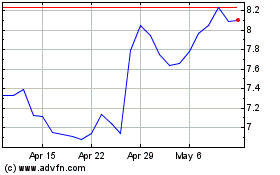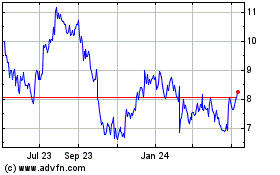By Richard Rubin and Theo Francis
Consumer-products conglomerate Newell Brands Inc., facing $180
million to $220 million in taxes because of Treasury Department
antiabuse regulations, isn't recognizing those costs in its
financial statement, contending the new rules aren't valid.
The move presages a legal fight between companies and the
government. Beyond tax revenue, the outcome may shape the
government's ability to implement some of the most sweeping
provisions of the 2017 tax law while Congress remains deadlocked
over technical fixes.
Newell, which makes Sharpie markers, Mr. Coffee machines and
Rubbermaid containers, told investors this month it was so
confident the government's rules will fall that it didn't have to
take an earnings hit. The tax cost would have swung the company
from profit to loss in the second quarter. Maxim Integrated
Products Inc., an analog chip maker, made a very similar disclosure
to its investors. Neither company would comment beyond public
filings.
Qualcomm Inc. said in a securities filing that the regulations
affected deductions related to a 2018 intellectual-property
transaction. The company agreed with the Internal Revenue Service
to forgo benefits of that transaction and took a $2.5 billion
charge. Qualcomm said it decided that complying with the regulation
was in the company's best interest.
Other companies flagged the new rules -- which are retroactive
to the end of 2017 -- in securities filings, though less clearly.
LyondellBasell Industries NV, a chemical company, and IHS Markit
Ltd., an information provider, disclosed that they may be affected.
More may file public comments to the government before a
mid-September deadline.
Accounting experts say that, in general, companies are expected
to recognize expenses once they are quantifiable and sufficiently
likely to occur.
"If it's probable and reasonably estimable, you're supposed to
do it," said Janet Pegg, an accounting analyst with Zion Research
Group. By concluding that the regulations are likely to fall,
companies may be able to convince their auditors to sidestep
recognizing the expense.
A spokeswoman for the Financial Accounting Standards Board,
which determines U.S. generally accepted accounting principles,
declined to comment on the companies' positions. A spokeswoman for
the Securities and Exchange Commission and Treasury officials also
didn't comment.
The corporations' complaints are the leading edge of a legal
challenge to the temporary, retroactive regulations, which the
Treasury released in June to stop and overturn what it saw as
abusive transactions made during gaps created by the 2017 tax
law.
The Treasury released the rules in mid-June, just days before
the deadline for imposing retroactive regulations back to the
enactment of the 2017 law. They resemble a January 2019 proposal
from Rep. Kevin Brady (R., Texas), a chief author of the tax law.
Congress hasn't acted on that or other changes because lawmakers
disagree over what to include in a technical-corrections package
and what other proposals to pair with it.
The U.S. Chamber of Commerce is examining the Treasury's
regulatory authority and exploring options to ensure a
business-friendly result, said Caroline Harris, the group's chief
tax counsel.
"Treasury wants to make this whole statute work," said David
Rosenbloom, an international tax lawyer at Caplin & Drysdale in
Washington. "They're basically stepping in and doing the job that
Congress didn't do."
One portion of the complex regulations aims at companies taking
advantage of a timing gap in the law by shifting profits into a
period when they could avoid U.S. taxes that would otherwise
apply.
The 2017 law created a territorial tax system, so that U.S.
corporations can send foreign profits to their domestic parents
without paying U.S. corporate taxes.
However, the law also created a minimum tax on foreign income.
That is intended to prevent companies from avoiding U.S. taxes on
profits from places with low tax rates such as Singapore and
Ireland.
Here's the catch: The territorial system started Jan. 1, 2018,
but the minimum tax didn't. Instead, it took effect based on the
fiscal year of companies' foreign subsidiaries, starting with the
first tax year beginning after Dec. 31, 2017.
Because many foreign subsidiaries have fiscal years ending Nov.
30, 2018, they had a one-time opportunity. They had nearly a year
when could earn low-taxed foreign income and bring the money home
without paying U.S. taxes.
"Once you saw that mismatch, that was the main ingredient and
environment you needed for the planning," said David Sites, an
international tax partner at Grant Thornton LLP.
There is no public data on what companies did, though the
Treasury rules said the government was aware of transactions that
have the potential to substantially undermine the purpose of the
tax law. Mr. Sites said some companies acted but the vast majority
won't be affected.
Still, U.S. corporate tax receipts for tax year 2018 were
unexpectedly soft, even considering the tax cut.
The Treasury's rules didn't attempt to tax all profits companies
earned during the gap in the law. Instead, they focus on what the
government deems extraordinary transactions, often achieved by
selling intangible assets from one foreign subsidiary to another.
Other parts of the rules apply more broadly.
Newell and Maxim both wrote in securities filings that they
believe they have strong arguments in favor of their position,
enough to conclude that they are more likely than not to prevail in
any challenge to the tax position they have taken. A court case
could turn on the government's regulatory authority to implement
congressional intent, the viability of retroactive regulations and
the question of whether the language of the statute was so clear
that the Treasury and IRS didn't have any ability to act.
Both companies also cautioned that the outcome is uncertain.
Maxim didn't estimate a cost and neither did IHS Markit.
LyondellBasell said it was permanently reinvesting money in an
offshore subsidiary because of the rules, preventing a $60 million
tax cost.
"This will be litigated," Mr. Rosenbloom said. "This is not
going to go down like chocolate sauce."
Write to Richard Rubin at richard.rubin@wsj.com and Theo Francis
at theo.francis@wsj.com
(END) Dow Jones Newswires
August 30, 2019 05:44 ET (09:44 GMT)
Copyright (c) 2019 Dow Jones & Company, Inc.
Newell Brands (NASDAQ:NWL)
Historical Stock Chart
From Mar 2024 to Apr 2024

Newell Brands (NASDAQ:NWL)
Historical Stock Chart
From Apr 2023 to Apr 2024
